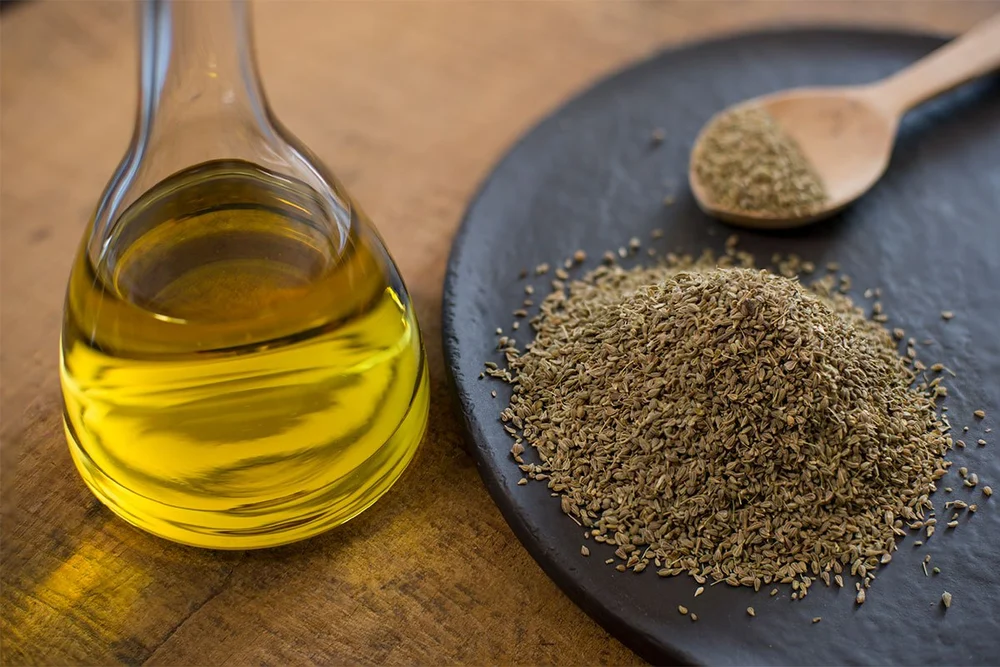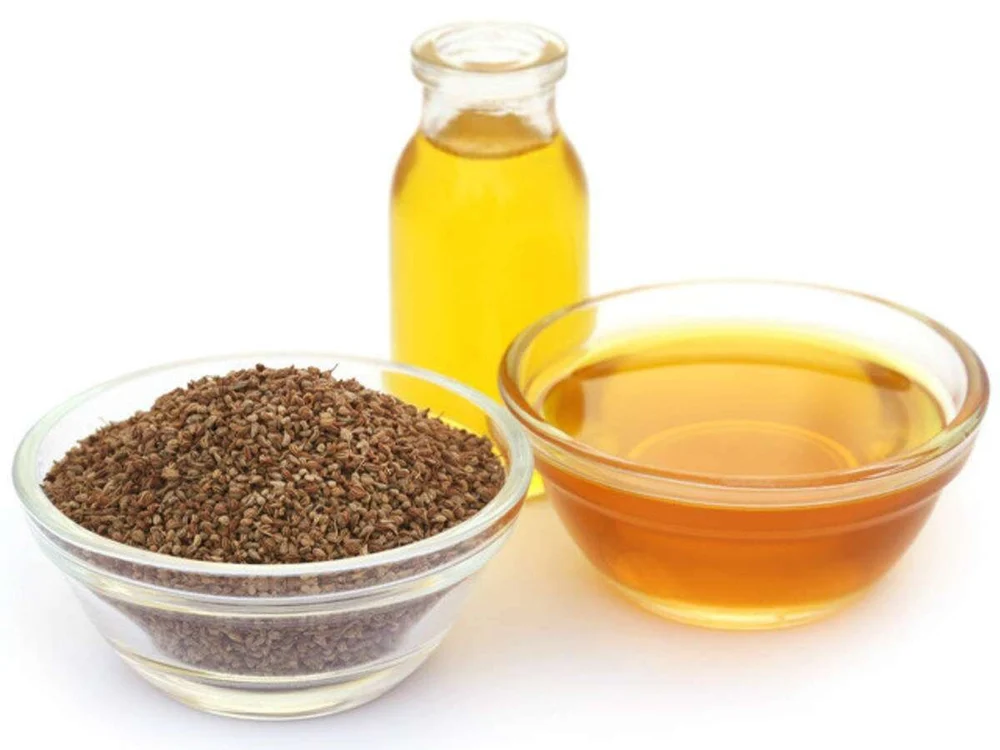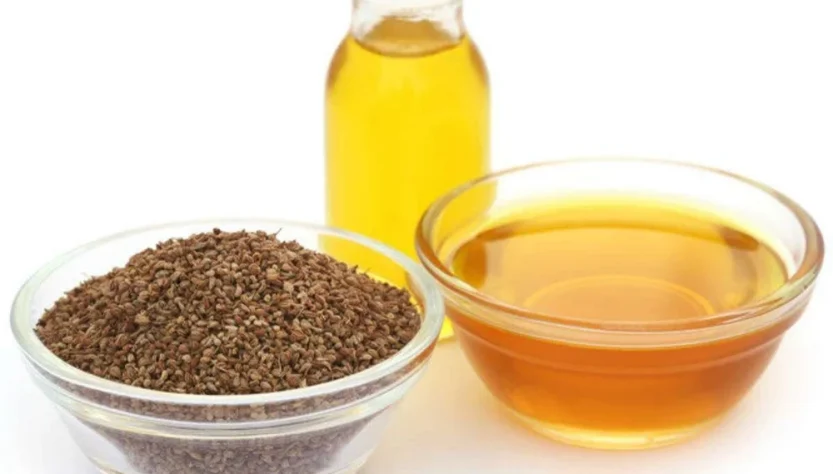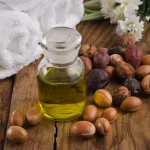Ajwain oil, also known as Carom oil. It is one of the potential natural products for health and is derived from the Ajwain tree. In traditional Indian medicine, Ajwain oil has been used for thousands of years for its significant health benefits. With its nutritional composition and special compounds, Ajwain oil has attracted the attention of many people around the world.
Join us to learn about the origin and special ingredients of Ajwain oil. As well as the health benefits it can bring through this article.
Origin and composition of Ajwain oil

Ajwain oil is extracted from the seeds of the Ajwain plant, a plant belonging to the Apiaceae family (celery family). The Ajwain tree originates from the Mediterranean region and is now widely grown in India, Pakistan and Iran. Ajwain fruit is oval shaped, dark yellow, has a pungent taste and strong aroma. The oil is produced through cold pressing to retain all the important nutrients and compounds. The oil is light yellow in color and has an aroma similar to Ajwain fruit.
Ajwain essential oil contains many important nutrients and compounds such as thymol, limonene, pinene, terpinene and other compounds. Thymol is a potent anti-bacterial and anti-inflammatory agent, while limonene and pinene have antioxidant properties. All these ingredients together contribute to the health benefits of Ajwain oil.
Read more: Asafoetida oil
What are the health benefits of Ajwain oil
Because it contains many important nutrients and compounds that are beneficial to health. Therefore, Ajwain oil offers a lot of health benefits. Some of the benefits that this essential oil brings are as follows:

Support digestive system
One of the main components of Ajwain oil is thymine, a substance with strong antibacterial and anti-inflammatory properties. Thymol can reduce the growth of harmful bacteria in the stomach and intestines. Helps improve the digestive process and reduces the risk of inflammation and indigestion symptoms such as nausea, bloating, and abdominal pain.
For people with gastrointestinal diseases, essential oils may help alleviate symptoms such as abdominal pain, indigestion, and diarrhea. Stimulate the digestive process, enhance nutrient absorption, and reduce intestinal irritation. In addition, oil can help alleviate symptoms of bloating.
Support respiratory system
The thymine in Ajwain oil has the ability to reduce airway obstruction and reduce symptoms of sinusitis. It also has antibacterial properties that help reduce respiratory problems such as coughing, colds, and bronchitis.
In addition, the antibacterial properties of thymine also help reduce respiratory problems such as coughing, colds, and bronchitis. Bacteria and viruses often cause these problems, and the antibacterial ability of thymine helps prevent its growth and transmission.
However, if you experience severe or persistent respiratory or sinusitis symptoms, please consult your doctor for appropriate evaluation and treatment. Ajwain oil can serve as a natural support method, but it cannot replace professional medical care. Please don’t use them as a medicine.
Anti-inflammatory and analgesic
The antibacterial properties of Ajwain oil come from its main component, thyme. Thymol has the ability to prevent the growth and transmission of bacteria that cause inflammation and infection. When applying Ajwain oil to inflamed or infected skin, it may help reduce inflammation and reduce the risk of widespread infection.
In addition, the anti-inflammatory properties of Ajwain oil also help reduce swelling, pain, and inflammation caused by joint pain and dermatitis. Inflammation is a natural response of the body to protect itself from harm, but persistent inflammation can lead to pain and discomfort. Ajwain oil may help reduce inflammatory reactions and related symptoms.
However, please note that Ajwain oil is usually used in the form of peripheral methods, such as massage or direct application to the skin. Before using Ajwain oil or any other product, please consult your doctor or medical professional to ensure safety and effectiveness, Especially if you have health issues that require treatment.
Weight loss support
This essential oil can stimulate metabolism and reduce appetite, which helps with the weight loss process. However, it is worth noting that the effectiveness and safety of Ajwain oil in weight loss have not been clearly demonstrated in clinical studies.
Ajwain oil contains compounds that can increase metabolism in the body. This means that it can help accelerate metabolism and burn energy, while also helping the body burn calories more effectively. However, if not combined with an overall healthy diet and lifestyle, this impact may not be sufficient to have a significant impact on the weight loss process.
In addition, this oil is also said to have the ability to reduce appetite. Some studies show that thymol found in Ajwain oil can affect the nervous system and help reduce hunger.
To achieve safe and effective weight loss results, the most important thing is to maintain a balanced diet and exercise regularly. If you are interested in using Ajwain oil as a weight loss aid. Consult a nutritionist or doctor for advice and recommendations that are appropriate for your health condition and personal goals.
Skin care
Ajwain oil has anti-bacterial and anti-inflammatory properties and can be used to treat skin problems such as acne, atopic dermatitis and minor wounds. In addition, it also helps soothe the skin and provide moisture to the skin. You can use it to treat acne with the following methods:
Apply to the skin
You can apply Ajwain oil directly to the skin to treat skin problems, such as acne, atopic dermatitis and minor wounds. You can mix 2-3 drops of Ajwain oil with a tablespoon of coconut oil or grapeseed oil and apply it to the affected skin area. Massage gently and let the oil absorb into the skin.
Steaming
You can steam Ajwain oil to clean and soften your skin. Boil a pot of water with 5-10 drops of Ajwain oil, then put your face close to the pot of water and breathe in the steam. You should cover your head with a scarf to increase effectiveness.
Shower
Drop 10-15 drops of essential oil in a warm water bath and soak for 15-20 minutes. You can also add some sea salt or oats to improve the effect. You should take a bath 2-3 times a week to achieve the best results.
Scalp care
Ajwain oil has antibacterial and anti-inflammatory effects, helping to clean the scalp and treat problems such as dandruff and scalp inflammation. It can also promote hair growth and smoothness. Gently massaging the scalp with oil can help relieve stress and fatigue, providing relaxation for the nervous system.
Dissolves kidney stones and treats urinary infections
Ajwain oil is said to be effective in reducing unpleasant symptoms caused by kidney stones and urinary infections. However, it should be noted that Ajwain oil cannot be a complete substitute for professional medical therapy and it is not recommended to self-treat with Ajwain oil without a doctor’s supervision.
Using 2 drops of essential oil in warm bath water and combined with abdominal and back massage, can be used as an adjunct. This combination can help stimulate the frequency and frequency of urination, thereby helping to remove toxins and salt from the urinary system and supporting the functioning of the urinary tract.
Read more: Angelica root oil
Does Ajwain oil have any side effects?
As a natural oil, so it has few side effects if used properly and in the right dosage. However, some people may experience the following side effects after using Ajwain oil:
Allergy
Some people may be allergic to this oil, causing symptoms such as itching, rash, and facial swelling, difficulty breathing and anaphylactic shock. If you experience allergic reactions, you should stop using Ajwain oil and seek medical help immediately.
Uterine stimulation
The oil can stimulate uterine contractions, causing the risk of miscarriage or premature birth. Therefore, pregnant and breastfeeding women should avoid using Ajwain oil. If possible, consult your doctor before using this essential oil.
Drug interactions
This essential oil may interact with certain medications, such as anticoagulants, antihypertensives, hypoglycemics, and anticonvulsants. If you are taking medications related to these conditions, you should consult your doctor before using this essential oil.
Read more: Anise oil
Notes when using
- Store in a cool, dry place, avoid direct sunlight and high temperatures.
- Store in dark, amber-colored bottles, jars, and jars with tightly closed lids.
- Do not use essential oils if they are detected. There is a strange smell or color or when an allergic condition occurs.
- Do not let essential oils fall into the eyes or other sensitive areas.
- Do not apply essential oils to open wounds.
- Do not use for pregnant women and children under 6 months old . If used by people with chronic diseases, they must have a doctor’s prescription.
- Keep out of reach of children
This essential oil is a natural product that may provide health benefits. It has been used in traditional medicine for a variety of purposes, including improving digestion, supporting breathing, protecting heart health, and having anti-inflammatory and analgesic effects. As with any natural product, you should consult a healthcare professional before using essential oil. Especially if you have any underlying medical conditions or are taking medication. They can provide personalized advice and guidance on safe and appropriate use based on your personal circumstances.
Read more: Argan oil
- Ajwain oil – Origin and composition of Ajwain oil - Tháng Mười Một 28, 2023
- Argan oil – Extracted from the seeds of the argan tree - Tháng Mười Một 24, 2023




